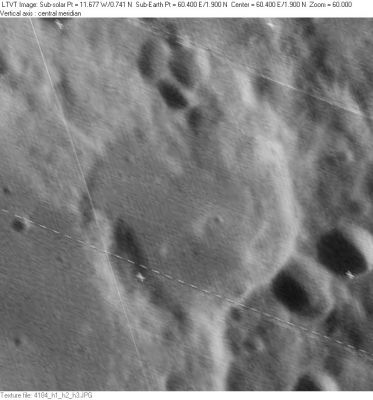Condon
Contents
Condon
(formerly Webb R)
|
Lat: 1.9°N, Long: 60.4°E, Diam: 34 km, Depth: 1.85 km, Rükl: 38 |
Images
LPOD Photo Gallery Lunar Orbiter Images Apollo Images
- Lunar Orbiter 1's Frame 029 shows Condon (left of photograph's centre), Webb (near lower left corner), Townley (near upper right corner), and bright Petit (south of Townley).
- Condon was captured on Apollo 10's frame AS10-31-4500. Can you see it?
- Condon was also captured on Apollo 17's panoramic ITEK-camera frames AS17-P-2915 - AS17-P-2920 (both of these frames show the eastern half of it, with bright raycraterlet on the northeastern part of Condon's rim), and AS17-P-2917 - AS17-P-2922 (both of these frames show Condon's western half). Note: in all of the LPI's scans of Apollo's ITEK-camera frames, north is always to the right!
- Research Lunar Orbiter 1, Apollo 10, and Apollo 17 photography: Danny Caes
Maps
(LAC zone 62C4) LAC map Geologic map LM map LTO map
Description
Description: Wikipedia
Additional Information
Depth data from Kurt Fisher database
- Westfall, 2000: 1.85 km
The Bright Spot W.N.W. of Condon
A curious high-albedo spot which looks like a raycraterlet (with sharp-edged ejectablanket around it) is located slightly west-northwest of Condon and slightly east of the peninsula at the bay-shaped crater Webb P. According to page 124 (LAC 62) in the Clementine Atlas, the bright spot is located at 2°30' North/ 58°50' East.
A close up of this bright spot was captured on Apollo 17's panoramic ITEK-camera frames AS17-P-2921 and AS17-P-2926. Explore both frames and you shall meet the bright spot while scrolling to the right, its central pit is also visible (you can't miss the spot!).
- DannyCaes Apr 27, 2011
Nomenclature
- Edward Uhler; American physicist (1902-1974).
- This replacement name for a formerly lettered crater was introduced on LTO-62C4 (for which it served as the chart title). - Jim Mosher
LPOD Articles
Bibliography
Edward U. Condon in the Sourcebook Project (William R. Corliss)
- In Lightning, Auroras, Nocturnal Lights, and related luminous phenomena (1982) :
- GLB1-R11: Scientific Study of Unidentified Flying Objects (Edward U. Condon, Bantam Books, New York, 1969). GLB1: "Ordinary" Ball Lightning.
- GLB18-R7: Coronal Effects, in Scientific Study of Unidentified Flying Objects (Edward U. Condon, New York, 1969). GLB18: Ball Lightning External to Aircraft (Foo Fighters?).
- GLD8-R25: Scientific Study of Unidentified Flying Objects (Edward U. Condon). GLD8: Earthquake Lights.
- GLD10-R9: Scientific Study of Unidentified Flying Objects (Edward U. Condon). GLD10: Tornado Lights.
- In Rare Halos, Mirages, Anomalous Rainbows, and related electromagnetic phenomena (1984) :
- GEZ6-R10: Scientific Study of Unidentified Flying Objects (Edward U. Condon, New York, 1969). GEZ6: Terrestrial Electrical Effects Correlated with Meteors.
- In Earthquakes, Tides, Unidentified Sounds, and related phenomena (1983) :
- GSH2-R32: Scientific Study of Unidentified Flying Objects (Edward U. Condon, New York, 1969). GSH2: Hissing and Buzzing Sounds Correlated with High-Altitude Meteors.
